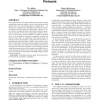Free Online Productivity Tools
i2Speak
i2Symbol
i2OCR
iTex2Img
iWeb2Print
iWeb2Shot
i2Type
iPdf2Split
iPdf2Merge
i2Bopomofo
i2Arabic
i2Style
i2Image
i2PDF
iLatex2Rtf
Sci2ools
125
click to vote
ARGMAS
2008
Springer
2008
Springer
Annotation and Matching of First-Class Agent Interaction Protocols
Many practitioners view agent interaction protocols as rigid specifications that are defined a priori, and hard-code their agents with a set of protocols known at design time -- an unnecessary restriction for intelligent and adaptive agents. To achieve the full potential of multi-agent systems, we believe that it is important that multi-agent interaction protocols are treated as first-class computational entities in systems. That is, they exist at runtime in systems as entities that can be referenced, inspected, composed, invoked and rather than as abstractions that emerge from the behaviour of the participants. Using first-class protocols, a goal-directed agent can assess a library of protocols at runtime to determine which protocols best achieve a particular goal. In this paper, we present three methods for annotating protocols with their outcomes, and matching protocols using these annotations so that an agent can quickly and correctly find the protocols in its library that achieve...
Agent Interaction Protocols | ARGMAS 2008 | Intelligent Agents | Interaction Protocols | Multi-agent Interaction Protocols |
Related Content
| Added | 12 Oct 2010 |
| Updated | 12 Oct 2010 |
| Type | Conference |
| Year | 2008 |
| Where | ARGMAS |
| Authors | Tim Miller, Peter McBurney |
Comments (0)

